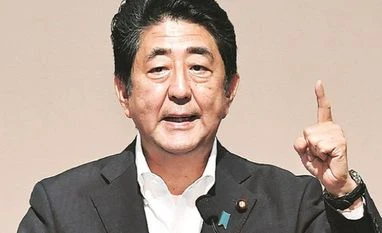EU, Japan conclude world's largest free trade agreement
Once completed it will forge an economic zone of 600 million people with 30 per cent of global GDP
)
Shinzo Abe
The EU and Japan announced on Friday they have finalised terms for a giant free trade deal, presenting it as a challenge to the protectionism championed by US President Donald Trump.
The trade deal, which the European Union called its biggest ever, must still be signed and ratified by both sides who first agreed to its broad outlines in July.
Once completed it will forge an economic zone of 600 million people with 30 per cent of global GDP.
Japanese Prime Minister Shinzo Abe hailed the imminent birth of what he called a "gigantic economic zone" when he confirmed the conclusion of the negotiations for the Economic Partnership Agreement.
"Japan and the EU will join hands and build an economic zone based on free and fair rules," Abe told reporters in Tokyo.
Abe and European Commission chief Jean-Claude Juncker said earlier the agreement, which had been four years in the making, has "strategic importance" beyond its economic value.
"It sends a clear signal to the world that the EU and Japan are committed to keeping the world economy working on the basis of free, open and fair markets with clear and transparent rules fully respecting and enhancing our values, fighting the temptation of protectionism," the pair said in a statement released in Brussels.
With the deal, the EU is seeking access to one of the world's richest markets, while Japan hopes to jump-start an economy that has struggled to find solid growth for more than a decade.
Japan is also hoping to seize an opportunity after the failure of the 12-nation Trans-Pacific Partnership (TPP) trade deal, torpedoed in January by Trump.
Under the deal, the EU will open its market to the world-leading Japanese auto industry, with Tokyo in return scrapping barriers to EU farming products, especially dairy.
EU officials insist that the deal will be a major boon for European farmers who would gain access to a huge market that appreciates European products.
Hailing the opening of markets, EU Trade Commissioner Cecilia Malmstroem told a press conference "this is actually the biggest trade deal we have ever negotiated from the European Union."
Malmstroem said negotiations for trade deals with Mexico and the south American Mercosur states were also at "advanced" stages.
The deals follow in the footsteps of last year's major EU-Canada trade deal, that was completed even as EU-US trade talks stumbled.
The finalisation of the EU-Japan trade terms now paves the way for the signature, ratification and full implementation of the deal, which EU officials hope could be as soon as January 2019.
But anti-trade activists who say such deals favour multinationals at the expense of democracy and the environment may influence events when the deal comes up for ratification in the bloc's more than 30 regional and national parliaments.
The trade deal, which the European Union called its biggest ever, must still be signed and ratified by both sides who first agreed to its broad outlines in July.
Once completed it will forge an economic zone of 600 million people with 30 per cent of global GDP.
Also Read
Japanese Prime Minister Shinzo Abe hailed the imminent birth of what he called a "gigantic economic zone" when he confirmed the conclusion of the negotiations for the Economic Partnership Agreement.
"Japan and the EU will join hands and build an economic zone based on free and fair rules," Abe told reporters in Tokyo.
Abe and European Commission chief Jean-Claude Juncker said earlier the agreement, which had been four years in the making, has "strategic importance" beyond its economic value.
"It sends a clear signal to the world that the EU and Japan are committed to keeping the world economy working on the basis of free, open and fair markets with clear and transparent rules fully respecting and enhancing our values, fighting the temptation of protectionism," the pair said in a statement released in Brussels.
With the deal, the EU is seeking access to one of the world's richest markets, while Japan hopes to jump-start an economy that has struggled to find solid growth for more than a decade.
Japan is also hoping to seize an opportunity after the failure of the 12-nation Trans-Pacific Partnership (TPP) trade deal, torpedoed in January by Trump.
Under the deal, the EU will open its market to the world-leading Japanese auto industry, with Tokyo in return scrapping barriers to EU farming products, especially dairy.
EU officials insist that the deal will be a major boon for European farmers who would gain access to a huge market that appreciates European products.
Hailing the opening of markets, EU Trade Commissioner Cecilia Malmstroem told a press conference "this is actually the biggest trade deal we have ever negotiated from the European Union."
Malmstroem said negotiations for trade deals with Mexico and the south American Mercosur states were also at "advanced" stages.
The deals follow in the footsteps of last year's major EU-Canada trade deal, that was completed even as EU-US trade talks stumbled.
The finalisation of the EU-Japan trade terms now paves the way for the signature, ratification and full implementation of the deal, which EU officials hope could be as soon as January 2019.
But anti-trade activists who say such deals favour multinationals at the expense of democracy and the environment may influence events when the deal comes up for ratification in the bloc's more than 30 regional and national parliaments.
More From This Section
Don't miss the most important news and views of the day. Get them on our Telegram channel
First Published: Dec 08 2017 | 11:04 PM IST
